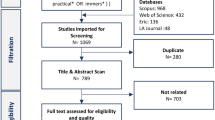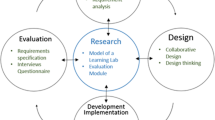Abstract
Living lab (or design-based research) in educational field is an iterative process where different stakeholders work together to design and test new digital tools for learning or teaching. Current literature review aims to describe how popular was living lab (design-based research) in educational research during 2010–2020 and what type of technological interventions were studied. The main focus was on types of data that were most often collected and how this data was analysed. We show that the number of education related living lab papers has increased compared to the years 2000–2010. Most of the data collected was descriptive and allowed descriptive analysis. About one third of studies mentioned data types and analyses types that are truly quantitative. Learning analytics was used in 4% of studies that was somewhat surprising for the educational field. There is lots of data presented in the literature that could be statistically tested and therefore the results would be more reliable. Data collection and analysis related strengths and weaknesses of living lab process in education are discussed.
Access this chapter
Tax calculation will be finalised at checkout
Purchases are for personal use only
Similar content being viewed by others
References
Anderson, T., Shattuck, J.: Design-based research: a decade of progress in education research? Educ. Res. 41, 16–25 (2012)
Barab, S., Squire, K.: Design-based research: putting a stake in the ground. J. Learn. Sci. 13, 1–4 (2004). https://doi.org/10.1207/s15327809jls1301_1
Barnes, T.A., Pashby, I.R., Gibbons, A.M.: Managing collaborative R&D projects development of a practical management tool. Int. J. Proj. Manag. 24, 395–404 (2006). https://doi.org/10.1016/j.ijproman.2006.03.003
Durovic, G., Dlab, M.H., Hoic-Bozic, N.: Research on the use of digital tools by STEM students at the University of Rijeka. TEM J. 8, 636–641 (2019). https://doi.org/10.18421/TEM82-43
von Hippel, E.: Democratizing Innovation. MIT Press, Cambridge (2005)
Leinonen, T., Keune, A., Veermans, M., Toikkanen, T.: Mobile apps for reflection in learning: a design research in K-12 education. Br. J. Educ. Technol. 47, 184–202 (2016). https://doi.org/10.1111/bjet.12224
Mitchell, W.: Me++: The Cyborg Self and the Networked City. The MIT Press, Cambridge (2003)
Reeves, T.C.: International perspectives on instructional technology research for the 21 st century. In: Annual AERA Meeting. New Orleans (2000)
Author information
Authors and Affiliations
Corresponding author
Editor information
Editors and Affiliations
Rights and permissions
Copyright information
© 2021 The Author(s), under exclusive license to Springer Nature Switzerland AG
About this paper
Cite this paper
Tuvi, I., Okkonen, J. (2021). Data in Educational Living Labs. In: Rocha, Á., Ferrás, C., López-López, P.C., Guarda, T. (eds) Information Technology and Systems. ICITS 2021. Advances in Intelligent Systems and Computing, vol 1331. Springer, Cham. https://doi.org/10.1007/978-3-030-68418-1_15
Download citation
DOI: https://doi.org/10.1007/978-3-030-68418-1_15
Published:
Publisher Name: Springer, Cham
Print ISBN: 978-3-030-68417-4
Online ISBN: 978-3-030-68418-1
eBook Packages: Intelligent Technologies and RoboticsIntelligent Technologies and Robotics (R0)




